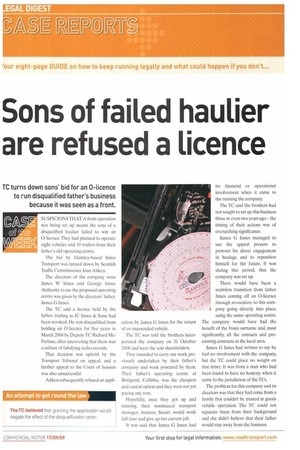Sons of failed haulier are refused a Licence
Page 22

If you've noticed an error in this article please click here to report it so we can fix it.
TC turns down sons' bid for an 0-licence to run disqualified father's business because it was seen as a front.
SUSPICIONS THAT A front operation was being set up meant the sons of a disqualified haulier failed to win an 0-licence. They had planned to operate eight vehicles and 10 trailers from their father's old operating centre.
The bid by Huntley-based Innes Transport was turned down by Scottish Traffic Commissioner Joan Aitken.
The directors of the company were James W lnnes and George Innes. Authority to use the proposed operating centre was given by the directors' father, James G Innes.
The TC said a licence held by the father, trading as JC Innes & Sons, had been revoked. He was disqualified from holding an 0-licence for five years in March 2008 by Deputy TC Richard McFarlane, after uncovering that there was a culture of falsifying tacho records.
That decision was upheld by the Transport Tribunal on appeal, and a further appeal to the Court of Session was also unsuccessful.
Aitken subsequently refused an appli
cation by James G lnnes for the return of an impounded vehicle.
The TC was told the brothers incorporated the company on 31 October 2008 and were the sole shareholders.
They intended to carry out work previously undertaken by their father's company and work procured by them. Their father's operating centre at Bridgend, Collithie, was the cheapest and easiest option and they were not yet paying any rent.
Hopefully, once they got up and running, their nominated transport manager, Annette Stuart, would work full time and give up her current job.
It was said that James G Innes had no financial or operational involvement when it came to the running the company.
The TC said the brothers had not sought to set up this business three or even two years ago — the dining of their actions was of overarching significance.
James G Innes managed to use the appeal process to protract his direct engagement in haulage and to reposition himself for the future. It was during this period, that the company was set up.
There would have been a seamless transition from father Innes coming off an 0-licence through revocation, to this company going directly into place, using the same operating centre. The company would have had the benefit of the Innes surname and, most significantly, all the contacts and preexisting contracts in the local area.
James G Innes had written to say he had no involvement with the company, but the TC could place no weight on that letter. It was from a man who had been found to have no honesty when it came to the jurisdiction of the TCs.
The problem for this company and its directors was that they had come from a family that couldn't be trusted in goods vehicle operation. The TC could not separate them from their background and she didn't believe that their father would stay away from the business.








































































































































